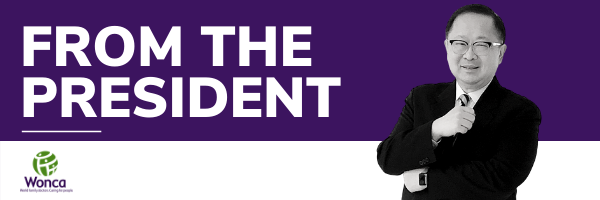From the President: September 2021
 Español Français 中文
Español Français 中文
Universal Health Coverage?
As family doctors we emphatically support the goal of Universal Health Coverage. We know that the best way to achieve Universal Health Coverage is to have a comprehensive, co-ordinated primary health care system as the basis for the whole health system, with clinically appropriate referrals between primary and secondary care. A crucial element of joined-up primary care is immunisation and vaccination, which provide the necessary protection against some of the world’s preventable illnesses, diseases and conditions.
After the fanfare of the Astana Declaration in October 2018, where every country signed up to and committed their nations to the delivery of Universal Health Coverage, there was hope that the goal was more achievable than ever.
Then COVID 19 happened and every nation was understandably addressing this major global health threat. Recognising that the threat is not unique to one country, that it does not respect borders, that it cannot be contained neatly, was important. One year ago, in my column in the September 2020 issue of WONCA News, I observed some of the challenges being faced across the world in the context of the pandemic, difficulties faced in reflecting accurate figures, and challenges in collecting data in ways which made comparisons easier and more meaningful. In the same column I also reflected on opportunities which the global threat offered.
‘This virus, though most unwelcome, has generated a desire – maybe even a need – for us to work collaboratively across nations, across specialities, across cultures, to help address issues of global importance. What is important and challenging in one country can quickly become important and challenging in many others.’
I now feel that this statement was overly optimistic, expressed too much hope in our health systems, in our politicians, in our development partners. As I write today, despite the development, the availability and the production of numerous effective vaccines, we are faced with intransigence, stubbornness and almost complete lack of collaborative work across nations to ensure that the basic act of vaccinating the global population against the threat of changing and mutating variants of this virus can happen.
The reasons for the appalling delay in providing vaccines to populations which need them are many. In the midst of the ongoing noise surrounding vaccinations there are the big pharma companies whose directors are protecting their patents; most big pharma companies (with one notable exception) refusing to provide vaccines at cost; governments storing and hoarding vaccines while millions of people in other countries are left unprotected; and governments buying-in to dubious assertions about efficacy of some vaccines.
We hear daily about vaccine diplomacy (which would appear to be anything BUT diplomatic), vaccine wars, information wars … when, in the real world, the battle is actually about fighting the virus and protecting the world’s population. When was the opportunity for collaborative working across nations, cultures, specialities squandered? Why was it squandered? The risk of this virus and its inevitable mutations remains a global risk. As global citizens, we cannot simply sit back and assume that the pharmaceutical economy will take an ethical or moral stand. We can now see, clearly, what is driving the battle within pharma. While no-one ever expected pharma companies to take a noble stand, we did expect governments to take a moral stand and do the right thing for humanity. The ongoing battle for precedence among pharma companies is unseemly. It is not pretty. And the refusal of governments to support their global neighbours – or make a show of sharing negligible doses of the vaccine - is a reflection of a world where empathy and compassion have all but disappeared.
If we, as global citizens, cannot even work together to achieve fair and equitable vaccination against the biggest global threat in history, how do we think we are going to work collaboratively to achieve Universal Health Coverage?
… and a PS
In the context of dispelling misinformation about COVID vaccines, the London School of Hygiene and Tropical Medicine has produced a mobile toolkit for practitioners, hosted on the WHO’s Digital Health and Innovation pages. This toolkit provides simple, useful information on sharing trusted sources of information; ready-to-go assets to share on social media accounts; and even support to create content. See
A Social Media Toolkit for Healthcare Practitioners - desktop (who.int)
Dr Donald Li,
WONCA President